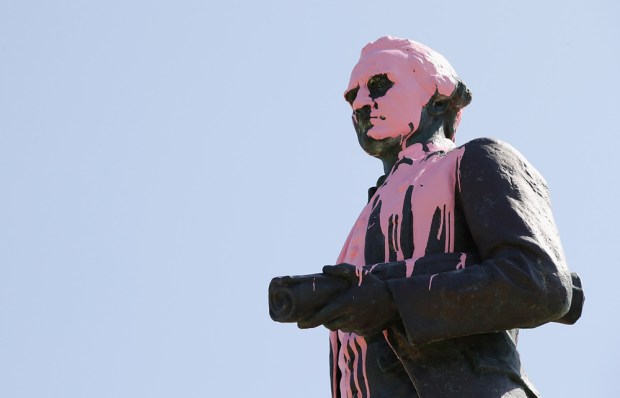Australia and the Western world have entered a new era of victimhood and separatism. Men and women have never had less in common. The battle of the sexes is no joke, it is a reality.
A case in point was the Voice to parliament referendum.
A year on from the defeat of the Voice, lessons are still being learnt about changes to the fabric of Australian democracy and the principles which hold it together. The defeat of the Voice was a decisive moment for the nation, one which confirmed most Australians still believe in the principle of political equality – but for how long?
The Institute of Public Affairs, in partnership with Advance, conducted the most detailed survey undertaken on the Voice referendum and Australians’ attitudes to the vote. A key finding from this research is that young Australian men and women are the most divided cohort in society today.
What defines Generation Z is how politically radical and diverse they are. The IPA’s research found young men aged 18 to 24 voted No at a greater rate than their 25 to 34-year-old male counterparts. Meanwhile, women aged 18 to 24 were the most likely to vote Yes, with 73 per cent saying they supported the Voice. Between men and women in the 18 to 24 age group there is a nine-percentage-point difference. This increases to 11 percentage points in the 25 to 34-year-old age group.
The data suggests young men today are more conservative when it comes to cultural issues and are therefore unlikely to support centre-right parties which fail to defend our culture. If the Coalition wants to take advantage of this shift, they will need to take a stand on cultural issues.
Across the Western world, in the United States, Canada and Europe, young male voters are gravitating towards the political right. Polling Director at the Harvard Kennedy School Institute of Politics John Della Volpe identified today’s youth electorate as a defining feature of the 2024 political landscape. ‘Make no mistake, this is a different youth electorate than we saw in 2020 and 2022,’ he said. ‘The gap between young men’s and young women’s political preferences is pronounced.’
This gender-divide explains why Gen Z is hyper-progressive on some issues and hyper-conservative on others. Young women are in the former camp and young men in the latter. While it is not surprising that there is an ideological separation between men and women, it is the size of the gap which is significant. United States Gallup poll data shows that left and right worldviews were spread equally across the gender divide for the past few decades. But today women aged 18 to 30 are 30 percentage points more progressive than their male contemporaries. This divide opened in just six years. Such a gulf does not bode well for future relationships, the formation of families and social cohesion.
Ultimately, the family unit is the building block of a successful society. The growing polarisation in the political views of young men and women will make it increasingly difficult for them to form relationships based on shared values. Today, there are approximately two conservative men for every conservative woman, and two liberal women for every liberal man. This problem is compounded by an increasing intolerance shown by progressives towards their political opponents.
Economic, cultural and political forces are pushing young men and women into opposing camps. Increasingly young men appear to have become the enemy of the left while young women appear to have become the enemy of the right. The hyper-masculinity of the right and the hyper-progressive femininity of the left play into and exacerbate this male-female divide.
In education, young boys are increasingly told they are responsible for patriarchal structures which oppress women and encourage violence. This narrative runs through programs like Respectful Relationships and Safe Schools in the National Curriculum. Under the guise of addressing bullying and violence, the programs instead are focused on effecting structural change and redistributing power between men and women.
A Pew Research Survey found 23 per cent of men believe the advancement of women has come at their expense. The rise of affirmative action and gender quotas in certain sectors supports this mindset, as does female economic success, with many women doing better than men financially. In some US cities young women have overtaken young men in median annual income. This feeds into the narrative that the success of women in the workforce is a zero-sum game.
Even feminists are now admitting the move of young men to the right could be a reaction against reductive gender stereotypes and a feminist society intent on shaming boys from school to the workplace. According to feminist activist Jess Hill, ‘Situating all little boys as potential perpetrators not only risks diluting much needed resources and effort, but it also invites confusion and potentially backlash from boys and young men who were never at risk of hurting their partners in the first place’. Hill’s words raise the possibility that the grievance industry built around domestic violence is increasing resentment.
It is unsustainable for any society to see either extreme feminism or masculinism dominate. The campaign for female empowerment in the modern world has been beneficial up to a point. However, today it is harming both men and women.
First wave feminism was about freedom, opportunity and choice. Today, at a practical level, women are more burdened than ever before – having to work a full-time job on top of caring responsibilities. Feminism has also emasculated men, with government increasingly taking the place of men in the lives of women.
The IPA’s research on the Voice highlights the growing ideological and political gap between men and women and shows it cannot be ignored. This situation presents both challenges and opportunities for Australian and Western political leaders. As noted by Imogen Sinclair, who heads up the pro-family New Social Covenant Unit, the current generation is reactive and dissatisfied, turning to the past to resolve current problems. She pointed out that, ‘Gen Z long for a political offer that satisfies their nostalgia for the things they’ve never known: marriage, parochial life and national pride’.
To protect our cultural inheritance and the fundamentals of freedom that have made Australia, and the West, so successful and prosperous, political leaders must return to principles which have stood the test of time, and present young people with viable solutions. If they do, they will likely be rewarded at the ballot box.
Got something to add? Join the discussion and comment below.
Brianna McKee is a Research Fellow and the National Manager of Generation Liberty at the Institute of Public Affairs
You might disagree with half of it, but you’ll enjoy reading all of it. Try your first month for free, then just $2 a week for the remainder of your first year.













